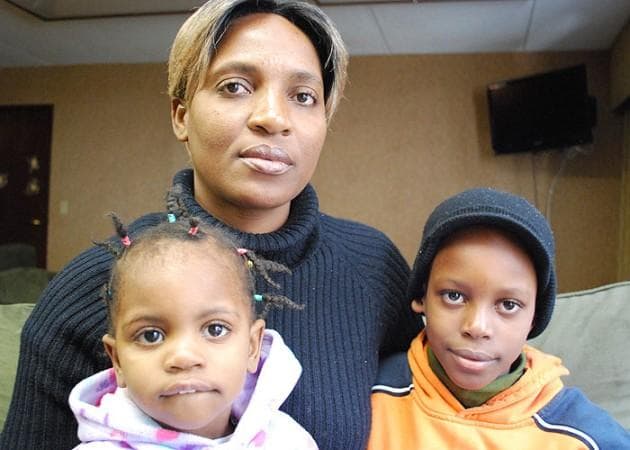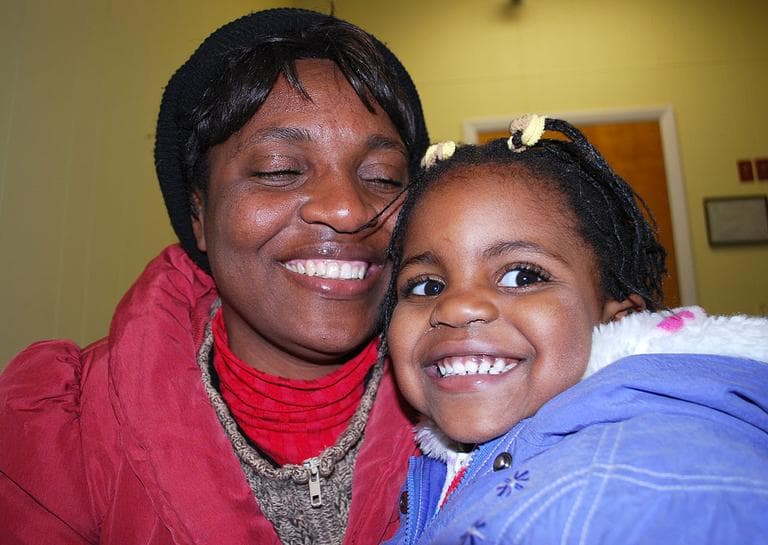Advertisement
One Year Later, Haitian Quake Victims Struggle For Financial Independence
Resume
After last year's devastating earthquake in Haiti, President Obama discouraged Haitians from taking refuge in the United States. But some found a way in and landed in the Boston area, the nation's third largest Haitian community.
WBUR profiled a woman who was able to come here because her baby is a U.S. citizen. At the time, she didn't know if her husband was alive, and she had lost her home and business. She received a six-month visa, but no work permit. She was living in a homeless shelter in Woburn. We wanted to see where she is now, because we thought it would say a lot about what's happened — or not happened — in Haiti.
BOSTON — People said Marie Honore Florence Millice was still here, but it wasn't easy to find her. The man who first introduced me to her, Franklin Dalembert, runs the Somerville Haitian Coalition. It took him a week to track her down.
She said she would do an interview. But we'd have to pick her up in Malden.
Florence — as she calls herself — was wearing a red, puffy coat and snow boots. She was carrying a back pack and had just left English class.
We took her to the shelter in Woburn. It's a chain hotel, where the state has rented out an entire wing for homeless women and their children.
We pass a young blond woman pushing a luggage cart piled with laundry baskets and kids' toys. Two little girls zig-zag in front of her. She's moving out of the shelter, she tells Florence, because she's got her own place now.

"An apartment?"
Yeah," she said.
"Oh, wow," Millice said.
Florence looks simultaneously happy and envious. When we get to her room, she explains why as Dalembert interpreted.
"I'm not OK. The kids are not OK," she said, looking around the room. It's a standard hotel double, with two beds and a television. The only thing out of the ordinary is the microwave sitting on top of a mini-fridge. Baskets of fruit rest on the desk. Children's drawings line the mirror.
"This is the only place that I have, but it is not an ideal place for me," Millice said.
A year ago, Millice said she didn't want to stay away from Haiti long-term, so the shelter didn't bother her much. She was happy to have a place to sleep. But now she thinks about a future for her toddler and her nine-year-old.
"In Haiti, everything that I owned was destroyed," she said. "I don't have a future. I don't even see a beginning in Haiti."
Her husband did survive the earthquake. But he's still in Port-au-Prince, and it's very difficult for him to get a visa to come to the U.S. But her situation here has improved.
Millice got something called temporary protected status to stay and work here. She has a driver's license, although she has no car. And last month she got a job at Dunkin' Donuts as a cashier.
Here's where I understand why it took so long to reach Florence.
"I have to wake up everyday at 2 a.m. and wake up the kids at 2 a.m. and drop them over [at] a family's house, and then they will bring them to school for me," she said.
The only job Florence could get is the opening shift at Dunkin' Donuts. The family who looks after her son and daughter were strangers just a few weeks ago. They saw Florence walking her kids to school every morning. They offered to help.
When the day is over, and Florence has finished work and English classes, she picks up her kids at 5 p.m. An hour later, they all go to bed.
This new job has complicated her life tremendously. But Florence said it's worth it, because she doesn't have to take as much welfare.
"For me, I didn't feel comfortable when somebody is giving to [me] — I'm not comfortable with that. Now I'm working, I am helping myself, even though I cannot go by myself. I know it will help me move forward," Millice said.
Dalembert said he's helped dozens of families like Florence's. Many of them are still in shelters.
"They're here to stay," he said. "They're here to establish. I don't see how they will go back to Haiti. They're here permanently."
It's not clear how many Haitians came here after the earthquake. The state said between 300 and 700 Haitian students have entered public schools since then. Those children may have come alone to live with relatives, or they may have come here with one parent, like Millice. Depending on how things go in Haiti, they'll likely be absorbed into Boston's growing Haitian population.
More:
This program aired on January 12, 2011.